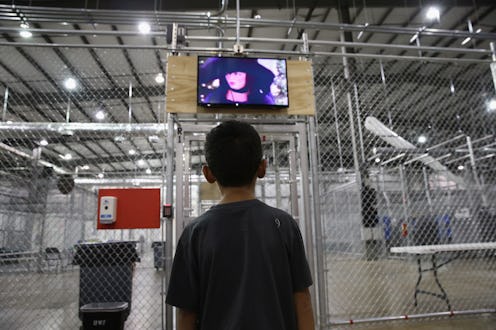News
A Lawsuit Says Migrant Kids Were Forcibly Drugged At Govt. Centers & The Details Are Awful

According to affidavits filed on April 23 in the United States District Court in California, one lawsuit claims migrant kids were drugged in government centers, specifically at the Shiloh Residential Treatment Center in Houston, Texas. According to the suit, there have allegedly been multiple instances of children being forcibly injected with medication as a way to control their behavior. Bustle reached out to the Shiloh Treatment Center, as well as the Department of Justice for comment, as Jeff Sessions is listed as a defendant in the lawsuit.
These children, some of which are in these facilities because of the Trump administration's zero-tolerance policy, were allegedly told a variety of lies about the medication. For example, the lawsuit claims the children were told that the pills were only vitamins, and that they would not be released to see their parents unless they yielded to the treatment.
These medications allegedly led to heavy sedation, dizziness, and even incapacitation in some cases. The drugs that were allegedly given were a wide array of anti-psychotic and psychotropic medications; psychotropic medications in particular are incredibly dangerous when administered to children, the filing reported, and can have long-term effects.
There are over 25 affidavits from children and parents in the court filing, as well as patient profiles, emails, and case reviews.
One such affidavit by a child revealed several alleged horrific details about her time spent at the Shiloh Residential Treatment Center:
I took nine pills in the morning and seven in the evening. I don't know what medications I was taking; no one ever told me that. I don't know what my diagnosis or illness is. ... Some of the staff at Shiloh would provoke the children there and make us angry intentionally. They made us act violently so then we had to be given shots. ...When [someone] called the medical staff, they would come and give me a shot to tranquillize me. It happened many times. They would give me the shot and then I would start to feel sleep and heavy, and like I didn't have any strength. ...I wanted to stop taking all the medications they were giving me at Shiloh but when I told the doctors that they told me that I had to continue because it calmed me.
According to Reveal, other instances described in the lawsuit included kids being unable to walk, wanting to sleep constantly, and even injuring themselves by falling and hitting their heads due to their sudden dizziness. This doesn't even begin to cover the flagrant violence and the physical and verbal abuse that is also alleged in the affidavits, from the supervisors to the children they were supposed to be taking care of.
According to psychiatrist Mark. J. Mills, who acquired all 420 pages of the filing and spoke to Reveal, the alleged use of medication was a clear strategy to "control agitation and aggressive behavior," behavior which, the affidavits suggest, was encouraged by the supervisors.
Mills continued, “You don’t need to administer these kinds of drugs unless someone is plucking out their eyeball or some such. The facility should not use these drugs to control behavior," he said. "That’s not what antipsychotics should be used for. That’s like the old Soviet Union used to do.”
Donald Trump might have finally signaled the end of his controversial family separation policy, but that doesn't give a clear answer as to what the plan is for reuniting detained children with their parents. In many instances, parents have already been deported, or are waiting in detention facilities themselves.
Ultimately, these allegations of misconduct aren't unique to the Shiloh Residential Treatment Center. Holly Cooper, a lawyer representing the plaintiffs in the case, emphasized to Huffington Post that the children's claims are much more far-reaching. The hearing for the lawsuit is set for June 29.